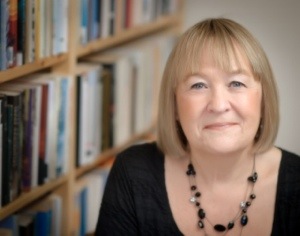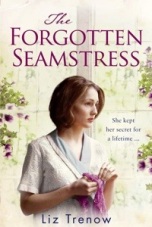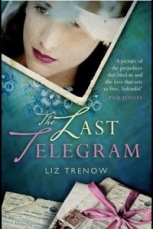 Liz Trenow is a former journalist who spent fifteen years on regional and national newspapers, and on BBC radio and television news, before turning her hand to fiction. Her first novel, The Last Telegram, was nominated for a national award and has also sold in the US and Germany. The Forgotten Seamstress is her second novel. She lives in East Anglia with her artist husband, and they have two grown up daughters. Find out more athttp://www.liztrenow.com and join her on Twitter @LizTrenow. Liz Trenow, author of The Forgotten Seamstress Harper Collins: ebook 5 December 2013, paperback 16 January 2014
Liz Trenow is a former journalist who spent fifteen years on regional and national newspapers, and on BBC radio and television news, before turning her hand to fiction. Her first novel, The Last Telegram, was nominated for a national award and has also sold in the US and Germany. The Forgotten Seamstress is her second novel. She lives in East Anglia with her artist husband, and they have two grown up daughters. Find out more athttp://www.liztrenow.com and join her on Twitter @LizTrenow. Liz Trenow, author of The Forgotten Seamstress Harper Collins: ebook 5 December 2013, paperback 16 January 2014
1.What got you into writing? I studied English at university and started my working life as a journalist, so I have always written. But although I have dabbled with short stories and poetry, I came to writing novels quite late. It was something I’d always wanted to do but never had time for. So, when I was lucky enough to get early retirement from my job, I went freelance and at the same time decided to try writing a novel. I suppose it felt like my equivalent of climbing Everest or getting a hole in one on the golf course, and I wasn’t at all sure I’d be able to do it.
2. What is a usual writing day like for you? I write in the mornings when my mind is freshest – usually starting around 8.30ish and continuing till my stomach rumbles for lunch. I start by reviewing and editing the section I wrote yesterday, to get me back into the ‘zone’ and then I usually try to write between 500 – 1,000 words each day. I always write in my study, a small room at the front of the house where there are not too many distractions! But I keep the door open so I can hear the comings and goings in the rest of the house. My imagination seems to close down after lunch so then I do research, admin, replying to emails, blogging and, when I’ve got to that stage, proof reading.
3. Do you get writers block? If so, how do you overcome it? Everyone gets ‘writer’s block’ from time to time. It’s just psychological and I tend to just call it ‘feeling unimaginative / uninspired’. In a television documentary the best-selling crime writer Ian Rankin talked about how, with each novel, he experiences what he describes as ‘the fear’, a point at which he thinks he’s writing complete rubbish that will never get published, and even if it did, that reviewers would slate and readers hate. I recognise that very well, and it was inspiring to hear such an experienced novelist talking about he has to work his way through it and hold faith that it will come right in time. So, to get over it, I just write. You just have to keep on going. Even though I know it’s not great writing, I know that I can go back and improve it tomorrow, or the next day.
4.Are you a plotter/planner when it comes to writing a story? Some and some. I like to write novels based on historical facts and/or characters so the history tends to dictate the plot in some respects. I usually know who the main characters are going to be and roughly what happens to them in the end. But secondary characters and plotlines tend to pop up along the way and the best thing is to go with them to see where they lead – that’s the exciting part of writing for me.
5.What was the publishing process like for you,& any advice to aspiring authors? I knew that I would need help to write my first novel, so I enrolled on a part-time MA in Creative Writing at City University in London. The first draft of my debut novel, The Last Telegram, was written as the ‘dissertation’ for this degree, and on the strength of it I was lucky enough to get an agent (Caroline Hardman, then with The Christopher Little Agency and now running her own agency). After lots of rejections Harper Collins Avon signed me for a two-book deal. The Forgotten Seamstress is my second novel. My advice to aspiring authors is to join a group: the support of my fellow MA students was invaluable. Once you trust your fellow-writers, make sure you are really honest with each other in your constructive criticism. Don’t submit anything to an agent unless you are really confident of it. Have your readership in mind but don’t get hidebound by it. Write characters whose company you enjoy / feel passionate about – you are going to spend at least a couple of years with them!
6. What has been your highlight since becoming a published author? a) receiving the box of bound copies of my first book, The Last Telegram. b) appearing on Radio 4’s Midweek programme with Libby Purves c) the photoshoot for an article I wrote about the book for the Daily Express – they even sent a ‘stylist’ to do my hair, make-up and clothes!
7. Can you share a little of your most recent book with us? In The Forgotten Seamstress (ebook published 5 December 2013, paperback 16 January 2014), two stories are told in parallel: In 1910 a young seamstress, Maria, is noticed by Queen Mary, patron of the London Needlework Guild, and employed in the royal household. In 2010 Caroline discovers that a patchwork quilt inherited from her grandmother contains unique royal silks. Through the fading memories of her mother, some family letters and photographs, some old cassette tapes and the help of a local journalist Caroline uncovers an extraordinary story involving a royal affair, a life of incarceration and two women whose lives collided with devastating consequences. Finally, she comes to understand what her Granny wanted her to know – the truth about herself and how she wants to live her own life. Here’s an excerpt from the first chapter: Cassette 1 Side 1, April 1970 They told me you want to know my story, why I ended up in that place? Well, there’s a rum question and I’ve been asking it meself for the past fifty years. I can tell you how I got there, and what happened to me. But why? Now that’s a mystery. It’s a deep, smoke-filled voice, with a strong East London accent, and you can hear the smile in it, as if she’s about to break into an asthmatic chuckle at any moment. They’ve probably warned you about me, told you my story is all made up. At least that’s what those trick-cyclists would have you believe. Another voice, with the carefully-modulated, well-educated tones of a younger woman:‘Trick-cyclist?’ Sorry, dearie, it’s what we used to call the psychiatrist, in them old days. Any roads, he used to say that telling tales – he calls them fantasies – is a response to some ‘ungratified need’. ‘You’re not wrong there,’ I’d tell him, giving him the old eyelash flutter. ‘I’ve been stuck in here most of me life, I’ve got plenty of ungratified needs.’
8. What do you like to do besides writing? Reading (of course, all writers must also read, for inspiration) and singing (I love to sing early and Baroque music). Also, spending time with my two grown-up daughters and walking on the beach at Walberswick in Suffolk – one of my favourite places in the whole world.
9. If you could trade places with any other person for a week, famous or not famous, living or dead, real or fictional, who would it be & why? Anna Maria Garthwaite, the 18th century silk designer, because my next novel will be based on her life, and very little is known about her. Becoming her for a week would solve all my research problems.
10. Do you have anything that you want to say to your readers? Thank you for being my readers. I wouldn’t be here without you. If you love my books, please tell your friends! Look out for my next novel, The Poppy Factory, to be published in August 2014.


